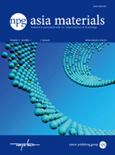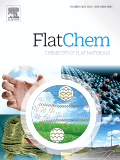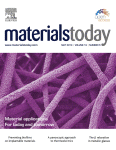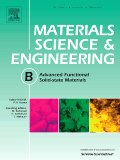
Annual Review of Materials Research
Scope & Guideline
Unveiling Breakthroughs in Materials Research
Introduction
Aims and Scopes
- Materials Characterization and Analysis:
The journal covers advanced techniques in materials characterization, including microscopy, spectroscopy, and computational methods, to provide insights into the structure-property relationships of materials. - Energy Storage and Conversion Materials:
A significant focus is placed on materials for energy applications, particularly in the development and optimization of batteries, fuel cells, and other energy storage systems, highlighting innovations in material design and performance. - Sustainable Materials and Processes:
The journal emphasizes research on sustainable materials, including recycling, upcycling, and the development of biodegradable materials, addressing the environmental impact of materials production and use. - Nanostructured and Functional Materials:
Research on nanomaterials and their unique properties is a core area, exploring how size and dimensionality affect material behavior, with applications ranging from electronics to biomedicine. - Mechanical and Structural Properties:
The examination of mechanical properties and the behavior of materials under stress, strain, and various environmental conditions is a fundamental aspect, contributing to the understanding of material durability and performance. - Emerging Technologies and Applications:
The journal encourages exploration of novel materials and their applications in cutting-edge technologies, such as quantum materials, spintronics, and biomaterials, showcasing the potential for innovation in various fields.
Trending and Emerging
- Electrochemical Energy Materials:
There is a growing emphasis on materials for electrochemical applications, particularly in relation to battery technologies and energy storage solutions, as seen in recent papers on lithium-ion batteries and innovative cathode materials. - Sustainable and Circular Material Technologies:
An increasing focus on sustainable practices, including the upcycling of materials and the development of biodegradable alternatives, aligns with global sustainability goals and reflects a shift towards environmentally friendly materials science. - Quantum Materials and Spintronics:
Emerging research on quantum materials and their applications in spintronic devices showcases a trend towards exploring materials with novel electronic properties, which could lead to advancements in information technology. - Biomaterials and Bioinspired Engineering:
The integration of biological principles into materials research, particularly in the development of biomaterials and bioinspired systems, is gaining momentum, highlighting the interplay between materials science and biology. - Advanced Characterization Techniques:
Recent publications indicate a trend towards employing cutting-edge characterization techniques, such as dynamic in situ microscopy and quantitative scanning transmission electron microscopy, to gain a deeper understanding of material behavior at the atomic level.
Declining or Waning
- Traditional Bulk Materials:
Research on conventional bulk materials has seen a decline, as the field shifts towards more complex and functional materials, such as nanostructured and hybrid systems, which are perceived as having greater potential for innovation. - Classic Mechanical Testing Techniques:
The focus on traditional mechanical testing methodologies has waned in favor of advanced computational and in situ techniques, which provide deeper insights into material behavior at smaller scales and under extreme conditions. - Low-Dimensional Materials with Limited Applications:
While low-dimensional materials were previously a hot topic, the emphasis has shifted towards those with clearly defined applications, leading to a decrease in publications focused solely on their theoretical aspects without practical implications.
Similar Journals

Accounts of Materials Research
Connecting minds in the multidimensional world of materials.Accounts of Materials Research is a premier journal published by the American Chemical Society, focusing on the multidimensional field of materials science. With a robust impact factor and a commitment to open-access research, it serves as a vital platform for leading-edge discoveries from 2020 to 2024. The journal has rapidly ascended to the top quartile in multiple categories, including Chemical Engineering, Materials Chemistry, and Polymers and Plastics, demonstrating its significant influence within the academic community. Recognized by Scopus as a key resource—with remarkable rankings that place it in the 95th percentile of its field—Accounts of Materials Research is devoted to publishing high-quality, innovative research that addresses critical challenges in materials development and implementation. This journal is essential for researchers, professionals, and students seeking to stay informed about the latest advancements and collaborative opportunities within the interdisciplinary landscape of materials science.

Frontiers in Materials
Exploring New Horizons in Materials Innovation.Frontiers in Materials, an esteemed journal published by FRONTIERS MEDIA SA, is a leading platform in the field of Materials Science, with a notable impact factor placing it in the Q2 category of its discipline as of 2023. Since its establishment as an Open Access journal in 2014, it has fostered considerable academic exchange, allowing researchers from around the globe to share their innovative findings and insights. Based in Lausanne, Switzerland, this journal not only emphasizes high-quality peer-reviewed articles but also prioritizes rapid dissemination of research, as evidenced by its commendable Scopus ranking of #62 out of 196 in Materials Science (miscellaneous). By consistently striving to bridge the gap between academia and practical applications, Frontiers in Materials serves as an invaluable resource for researchers, professionals, and students seeking to delve into cutting-edge advancements and transformative applications in materials science.

ADVANCED MATERIALS
Pioneering Innovations in Materials ScienceAdvanced Materials, published by Wiley-VCH Verlag GmbH, is a premier academic journal that serves as a crucial platform for cutting-edge research in the field of materials science and engineering. With an impressive impact factor and ranking among the top tiers in various categories, including Materials Science, Mechanical Engineering, and Nanoscience, this journal is recognized for its high-quality contributions and relevance to contemporary research challenges. Spanning from 1989 to 2024, Advanced Materials not only features groundbreaking studies but also provides insights into innovative applications and advancements in material design and engineering. Researchers, professionals, and students alike will benefit from the rigorous peer-review process and diverse range of topics covered, making it an indispensable resource for those aiming to stay at the forefront of materials science innovation.

ACS Materials Letters
Innovative Insights for Tomorrow's TechnologiesACS Materials Letters is an esteemed peer-reviewed journal published by the American Chemical Society, emphasizing groundbreaking research and advancements in the fields of materials science, biomedical engineering, and chemical engineering. With a robust update and established reputation since its inception in 2019, this journal has rapidly ascended to the top tiers, achieving Q1 rankings in key categories such as Biomedical Engineering, Chemical Engineering (miscellaneous), and Materials Science (miscellaneous) in 2023. The journal boasts impressive Scopus rankings, including #14 in General Chemical Engineering and #19 in Biomedical Engineering, placing it among the elite publications in these domains. While not fully open access, ACS Materials Letters facilitates the dissemination of high-impact research accessible to academics and industry professionals alike. With its comprehensive scope and rigorous selection process, the journal serves as a vital resource for researchers and students eager to stay abreast of the latest innovations and technologies shaping materials science and engineering.

NPG Asia Materials
Navigating the Future of Materials with Expert PerspectivesNPG Asia Materials, a premier journal published by NATURE PORTFOLIO, stands at the forefront of research in the fields of condensed matter physics, materials science, and modeling and simulation. With an impressive Impact Factor gracing its Q1 rankings in 2023, this open-access journal, established in 2012, offers a vital platform for disseminating high-quality research articles, reviews, and perspectives that advance the understanding of material properties and innovative applications. Based in the United States and catering to a global audience, NPG Asia Materials features cutting-edge contributions that not only enhance academic scholarship but also provoke discussions relevant to both industry and academia. Researchers, professionals, and students are invited to explore its extensive archive of work, covering insights from 2009 to 2024, in a bid to stay abreast of the latest developments in these rapidly evolving scientific domains.

FlatChem
Championing Open Access for Groundbreaking Material ScienceFlatChem, an esteemed journal published by ELSEVIER, serves as a premier platform for disseminating high-quality research in the dynamic fields of ceramic and composite materials, electronic and optical materials, materials chemistry, and surfaces, coatings, and films. Since its inception in 2017, the journal has garnered a robust reputation, evidenced by its rank in the top quartile (Q1) across multiple categories, including a commendable rank of #25/127 in Ceramics and Composites and #49/284 in Electronic, Optical and Magnetic Materials. With a focus on pioneering advancements and innovative methodologies, FlatChem not only highlights cutting-edge research but also promotes collaboration and knowledge exchange within the scientific community. The journal’s impact is underscored by its impressive rankings in Scopus, marking it as a vital resource for researchers, professionals, and students aiming to stay at the forefront of materials science. As an open-access journal, it ensures that groundbreaking findings are readily accessible, fostering a broader understanding and application of materials innovation worldwide. The journal is based in the Netherlands, with its headquarters located at RADARWEG 29, 1043 NX AMSTERDAM, NETHERLANDS. Join the vibrant community contributing to FlatChem and engage with the forefront of material advancements.

Materials Today
Driving Excellence in Material InnovationsMaterials Today is a premier academic journal published by Elsevier Science Ltd, specializing in the dynamic fields of materials science, mechanical engineering, and condensed matter physics. Established in 1999, the journal has garnered an enviable reputation, consistently ranking in the Q1 category across multiple disciplines including mechanics of materials and general materials science, reflecting its influence and high-quality research output. With an impressive Scopus ranking—4th in both mechanical engineering and mechanics of materials, and 6th in condensed matter physics—Materials Today serves as an essential resource for researchers, professionals, and students seeking to stay at the forefront of developments in material innovations and applications. The journal is known for its commitment to publishing significant research findings and reviews, making it a vital platform for disseminating knowledge and fostering collaboration in the rapidly evolving materials field. Although it does not offer open access, its robust impact factor underscores the importance of the content published, ensuring wide visibility and citation among the academic community. Explore the rich tapestry of materials research with Materials Today, where groundbreaking insights pave the way for future technological advancements.

Materials Today Advances
Elevating research visibility in cutting-edge materials science.Materials Today Advances is a premier open access journal, published by Elsevier, dedicated to disseminating cutting-edge research in the fields of Materials Science and Mechanical Engineering. Since its inception in 2019, the journal has quickly established itself within the academic community, achieving an impressive Q1 quartile ranking in both disciplines as of 2023, indicative of its high-impact contributions. Ranked #25 out of 672 in Mechanical Engineering and #46 out of 463 in General Materials Science according to Scopus, Materials Today Advances offers rigorous peer-reviewed articles that address the latest innovations and interdisciplinary approaches. Researchers, professionals, and students can benefit from the journal's open access model, ensuring widespread visibility and accessibility of groundbreaking findings. With the convergence of advanced materials research and practical applications, this journal represents a vital resource for those at the forefront of scientific discovery.

Materials Science and Engineering B-Advanced Functional Solid-State Materials
Advancing the Future of Solid-State MaterialsMaterials Science and Engineering B: Advanced Functional Solid-State Materials, published by Elsevier, stands as a pivotal platform in the realm of materials science, focusing on the development and characterization of advanced solid-state materials. With an ISSN of 0921-5107 and E-ISSN of 1873-4944, this journal operates out of the United Kingdom and addresses critical issues in condensed matter physics, mechanical engineering, and mechanics of materials. Its consistent recognition, evident in its Q2 quartile rankings across multiple engineering and physics categories and a respectable scope of convergence from 1988 to 2024, signifies its substantial contribution to the field. Researchers and professionals seeking a venue for cutting-edge work will appreciate the journal's commitment to advancing knowledge in functional materials, with its open access features ensuring that innovative findings are readily accessible. Join a community of leading scholars engaging with the latest advancements, shaping the future of materials science.

Frontiers of Materials Science
Transforming Ideas into Reality in Materials ResearchFrontiers of Materials Science is a groundbreaking journal dedicated to exploring advanced materials and their applications within the ever-evolving landscape of materials science. Published by HIGHER EDUCATION PRESS, this journal offers a crucial platform for scholars and practitioners seeking to disseminate innovative research findings that foster interdisciplinary collaboration. Since its inception in 2011, the journal has enjoyed a notable Q2 ranking in the category of Materials Science (miscellaneous) as of 2023, positioning it among the noteworthy publications in the field with a Scopus rank of #222 out of 463. While predominantly published in China, the journal is committed to open access principles, allowing global accessibility to cutting-edge research. With its comprehensive coverage spanning materials synthesis, characterization, properties, and applications, Frontiers of Materials Science not only serves as a repository for academia but also bridges the gap between research and industry, making it an indispensable resource for researchers, professionals, and students alike.